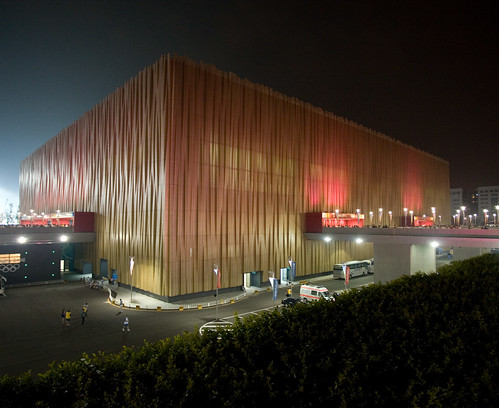In our (seemingly regular) season of big Western Entertainment company problems, we present a story about AEG.
After taking a full 16 months to get the Wukesong arena in Beijing match-fit, and opening it last October in a blaze of Beyonce glory (losing shirts in the process), AEG, the global entertainment company, have had their relationship with the venue “restructured”. The owners of the property will now be paying all the bills (heating, light and wages). Contract renegotiations for key staff are ongoing.

Wukesong was the first piece in a jigsaw that would see AEG provide world class venue management and programming for arenas in 6 different cities. It also seems to be the first nail in the coffin of another big international entertainment company that thought they could apply a Western set of rules to the Chinese marketplace. AEG were supposed to bring content and sponsorship to the venue, but due to a lack of available talent that could actually fill the 10,000 capacity arena at prices reasonable for the local market, plus a tough year for sponsorship, they struggled to make the kind of impact they had hoped for. Add to this unfavorable working conditions (apparently, the local PSB (police) at Wukesong are “hard” to work with) and Beijing’s traditional indifference to spending big money on tickets, and you have a big set of problems for AEG’s building management and sponsorship model. Alan de Zon, ex-Emma, Ticketmaster VP had been charged with the expansion. He has now left the company.
Eyes will now turn to the 18,000 capacity Swee-Pac arena in Shanghai, which AEG will inherit after the Expo in November. They have already pulled off a major coup, committing Mercedes to an 8 year, US$65m deal for naming rights. The only flaw in this great master plan is that they may well struggle to provide the 100+ events per year that the contract requires. Shanghai is still China, and the market there is no further developed than in Beijing.
AEG did an amazing job getting Wukesong up to international standards. They were left with a poor excuse for a venue at the end of the Olympics in August 2008, one that had to be largely torn down and rebuilt. They spent more than a year overcoming hurdles and barriers to actually get the place up to standards befitting an internationally managed multi-purpose arena (when they entered the venue post Olympics, there was no stage, inadequate power and no “roof” – they have since installed a 50 tonne mothergrid amongst other things). It does seem, however, that the lack of competitiveness at the top level of talent buying in China, allied to the unfavorable working conditions have rendered AEG’s investment one that will be chalked down to experience.
The likelihood is that key staff will be retained by the Chinese owners. There are parts of this new venue that at best would be unwise to be left in underskilled hands, at worst, dangerous. A 50 tonne roof is not to be trifled with.
It is unfortunate that another big Western initiative in the Chinese entertainment market has been so abruptly curtailed (see HERE for the recent Ticketmaster unwinding). There is no doubt that this will serve as another cautionary tale to Western investors. This is not to say that there aren’t opportunities – in fact, with the rapid growth of the music industry here, opportunities are becoming more and greater by the month. It’s just that there is NO QUICK FIX. The Chinese music industry is still light years behind its Western counterpart, both in terms of size and sophistication. Strategies here must be nuanced and localized, with medium to long term horizons. What Ticketmaster, Livenation and AEG have all failed to realize in the initial stages it that the Western model cannot and should not be applied too literally to China.